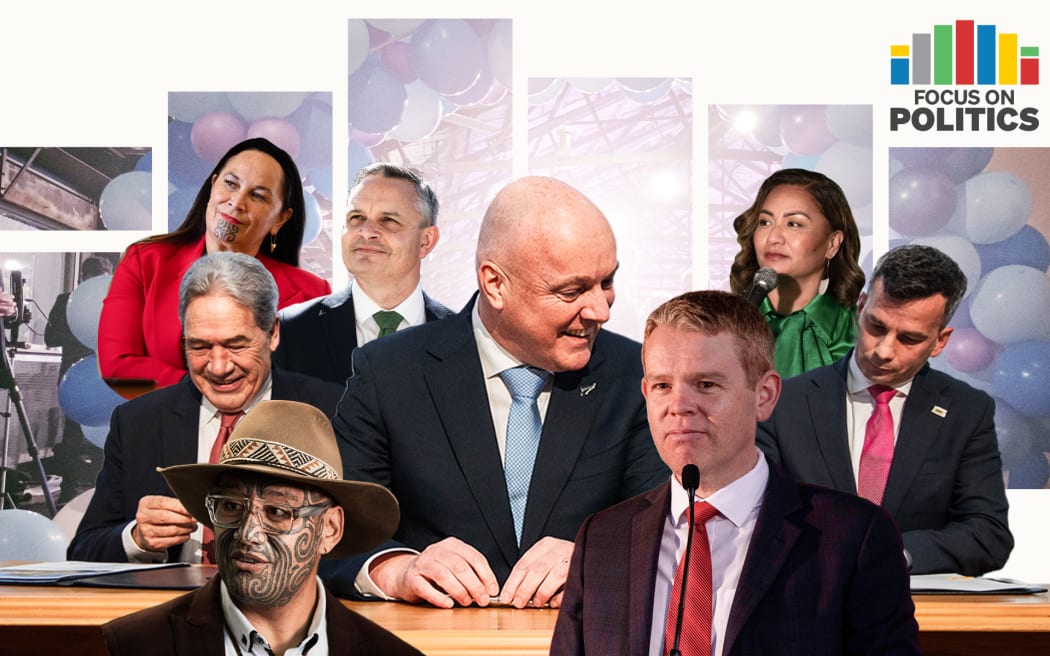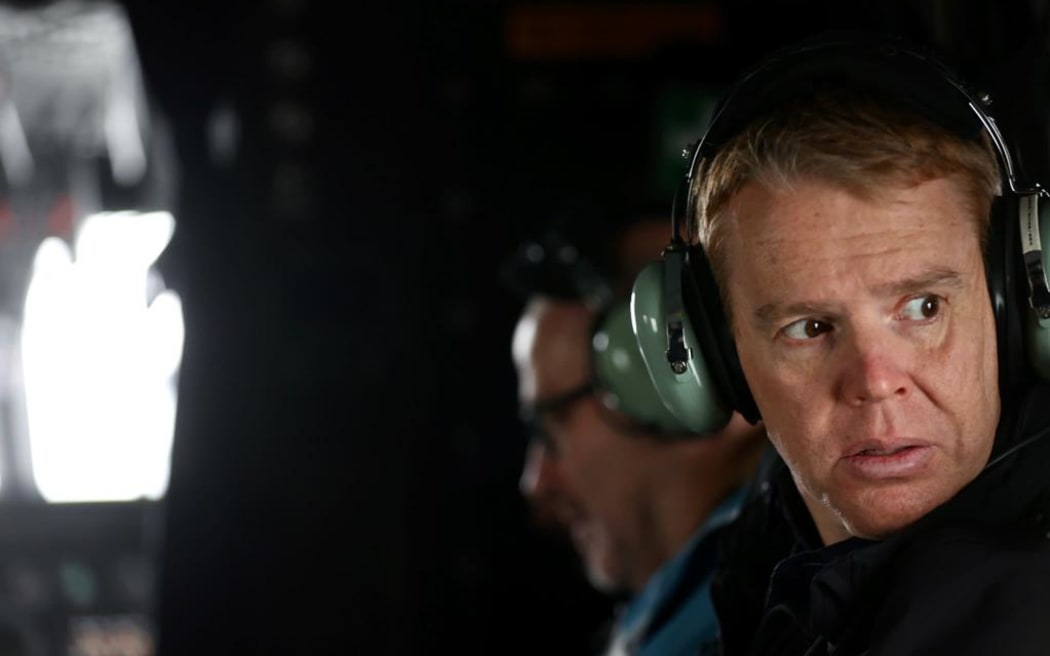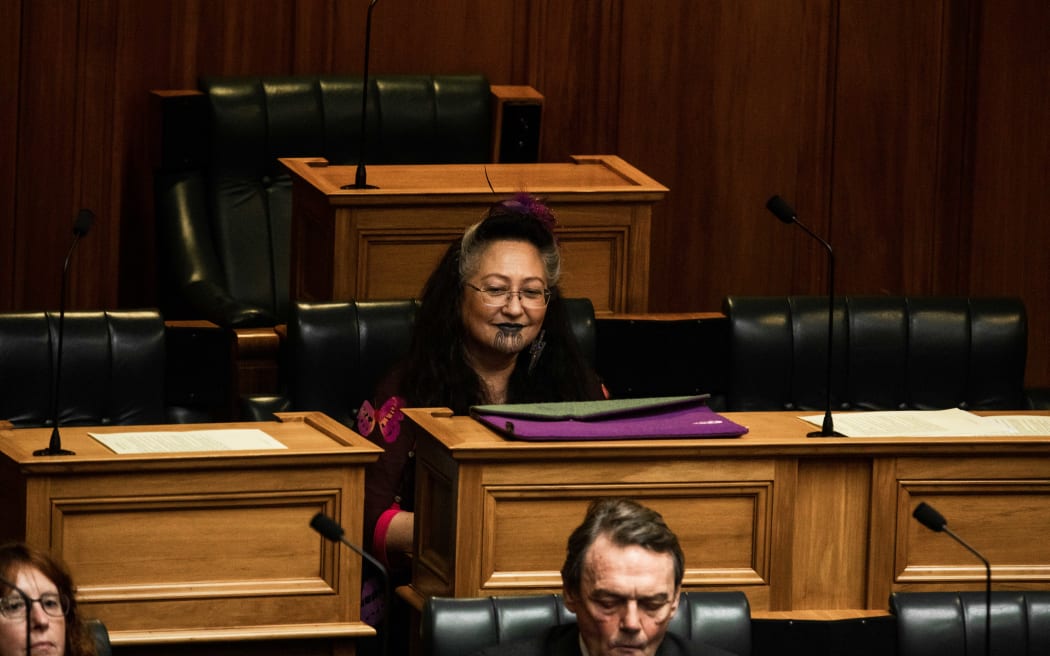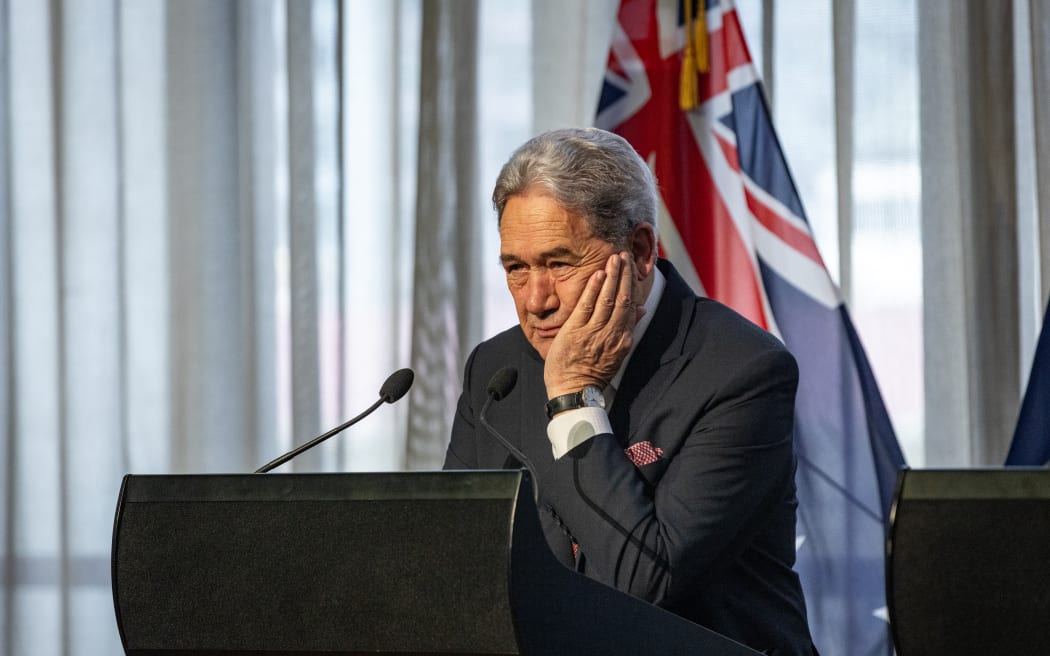
Photo: RNZ
"What we have achieved together, I think, is historic" - Christopher Luxon
Three prime ministers, four ministerial scandals, one general election and a three-way coalition: New Zealand's political landscape has been well and truly shaken up in 2023.
Jacinda Ardern was thinking about work at the beginning of the year as most New Zealanders were taking the time to relax over their summer break. Her resignation announcement in January shocked New Zealanders out of their summer slumber and sent Labour on the hunt for a new leader.
With the most obvious successor Grant Robertson taking himself out of the race, Chris Hipkins was tipped as next most likely. The self-described "boy from the Hutt" soon became New Zealand's 41st prime minister.
His honeymoon period was short-lived, however, with the arrival of a series of summer storms including flooding in Auckland and Northland, and Cyclone Gabrielle, leaving a path of destruction across the upper North Island: towns cut off and uncontactable, critical infrastructure and thousands of homes damaged, hundreds of people displaced.
Fifteen people dead, including a two-year-old. Many communities are still recovering.
It was Hipkins' first challenge as prime minister, leading the country through disaster - but the general election set for 14 October was also looming.

Then-prime minister Chris Hipkins takes a helicopter to cyclone-hit Wairoa. Photo: Pool / George Heard
No government has replaced a prime minister in an election year and gone on to win, so in hopes of defying history he rolled out the policy incinerator, exhausting the phrase "bread and butter" as he sought to eliminate what he saw as Labour's political liabilities and focus on the cost of living crisis.
There were other liabilities lying in wait however, as a series of scandals went on to rock the left in just a few short months.
Stuart Nash, in an extraordinary own goal, lost his beloved Police portfolio after stating on air he had once encouraged the police commissioner to appeal a court decision. He assured Hipkins he had made no other mistakes, so was promptly sacked from Cabinet after it was revealed two weeks later he'd once emailed confidential information to donors.
In April, just hours after Jacinda Ardern's final speech in Parliament, Green MP Elizabeth Kerekere messaged the wrong group chat, badmouthing colleague Chlöe Swarbrick and appearing to describe her as a "crybaby". Kerekere soon faced accusations of bullying - and later levelled accusations of her own at the party's co-leaders as she exited Parliament.

Elizabeth Kerekere Photo: RNZ/ Samuel Rillstone
Hipkins' own personnel problems continued, with Meka Whaitiri completely blindsiding him and Labour's entire caucus by defecting to Te Pāti Māori shortly after his departure to London for the King's coronation.
Then it was revealed Transport Minister Michael Wood had failed to properly declare shares in Auckland Airport, made even more baffling because the Cabinet Office had reminded him a dozen times to sell them. The discovery of even more undisclosed shares meant Wood had no choice but to resign.
But perhaps the most challenging was Justice Minister Kiri Allan facing charges of careless use of a motor vehicle and refusing to accompany a police officer. She agreed to resign all her portfolios and left politics at the election but is still before the courts, having pleaded not guilty to the latter charge.
The public was clearly unhappy with these ministerial missteps, as polls showed rising support for a change in government.
Read more:
- Peters defies opposition as repeals and rollbacks roll on
- Māori dissent sets the scene as Parliament returns
- Distractions assail coalition as it lays out ambitious agenda
- Coalition deals signed and sealed, now it's time to deliver
- Labour faces vexed reset and return to opposition
When the election campaign kicked off, so too did the usual craziness: National leader Christopher Luxon dressed as a pirate, Hipkins visited Dunedin flat The Love Shack, ACT's David Seymour did laps of a race course, and NZ First candidate Shane Jones embraced TikTok. Vision New Zealand candidate Karl Mokaraka also made his presence known, sneaking into various rivals' campaign events, donning a fake moustache at one.
Luxon campaigned with incredible energy, confidently pitching his tax cut policy to the public: he was "rock solid" on the numbers, despite economists raising concerns about a lack of evidence.

Christopher Luxon fences with a pirate. Photo: RNZ / Giles Dexter
Hipkins by contrast struggled early on, especially when chatting with the public. Labour's candidates continued to cause distractions too: sharing misinformation about National's policies and openly backing a wealth tax despite their leader having ruled one out.
The Chrises clashed in election debates, but NZ First leader Winston Peters quickly became a central character of the campaign. He'd ruled out working with Labour, and Hipkins responded in kind, but National left their own position on that an open question for months - finally making the call just three weeks from election day.
Luxon made it clear he really, really didn't want to work with Peters - the party even threatening the possibility of a second election - but said he would pick up the phone to make a deal if he had to.
In the end, he did.
National was celebrating on election night with a clear mandate to lead the next government - combined with ACT, they were looking at 61 seats in a 121-seat Parliament. NZ First was also jubilant - back in Parliament after three years - and the final vote confirmation nearly three weeks later meant the party would be a necessary component in government.

Winston Peters at the announcement of the coalition deals. Photo: Phil Smith
Labour was much more somber, support falling from 2020 about 50 percent down to 27 percent. Mixed emotions for the Greens who surged to 15 MPs and picked up three electorates but were relegated to opposition. Te Pāti Māori ended up welcoming four new MPs through electorate wins across six of the seven Māori seats. This included Hana-Rāwhiti Maipi-Clarke becoming the youngest MP in 170 years and unseating one of Labour's most seasoned campaigners, Nanaia Mahuta.
Negotiations to form a government dragged out for weeks, but at last produced New Zealand's first three-way coalition: Luxon would be prime minister with Winston Peters as his deputy for half the term, before handing that role to Seymour.
A terrible eruption of violence in the Israel-Palestine conflict meant the new government was immediately faced with a complex international crisis. Thousands protested in New Zealand, some supporting calls for a ceasefire, others backing Israel. The coalition's response first called merely for "steps towards" a ceasefire in Parliament, then outright demanded an "immediate humanitarian ceasefire" at the UN.
The new government also had domestic priorities to attend to, and soon set out its plan for the first 100 days: 49 actions including repealing smokefree laws, three waters, and fair pay agreements. Peters' accusations against the media quickly distracted from that, however.

Te Pāti Māori co-leader Rawiri Waititi leads a protest against the government's policies affecting Māori to Parliament. Photo: RNZ/Samuel Rillstone
The 54th Parliament gathered for the first time with just weeks before it was due to rise again, the occasion marked by by protests both outside the building and from those within over policies affecting Māori, the smokefree laws, and fair pay agreements, amid warnings from the new opposition this was just the start.
The House sits again at the end of January, not long before Waitangi Day, for what will no doubt be another eventful year.
In this week's Focus on Politics, Political Reporter Katie Scotcher takes a look back on what was a turbulent year at Parliament and on the campaign trail.
Listen free to Focus on Politics on Apple Podcasts, on Spotify, on iHeart Radio or wherever you get your podcasts.


